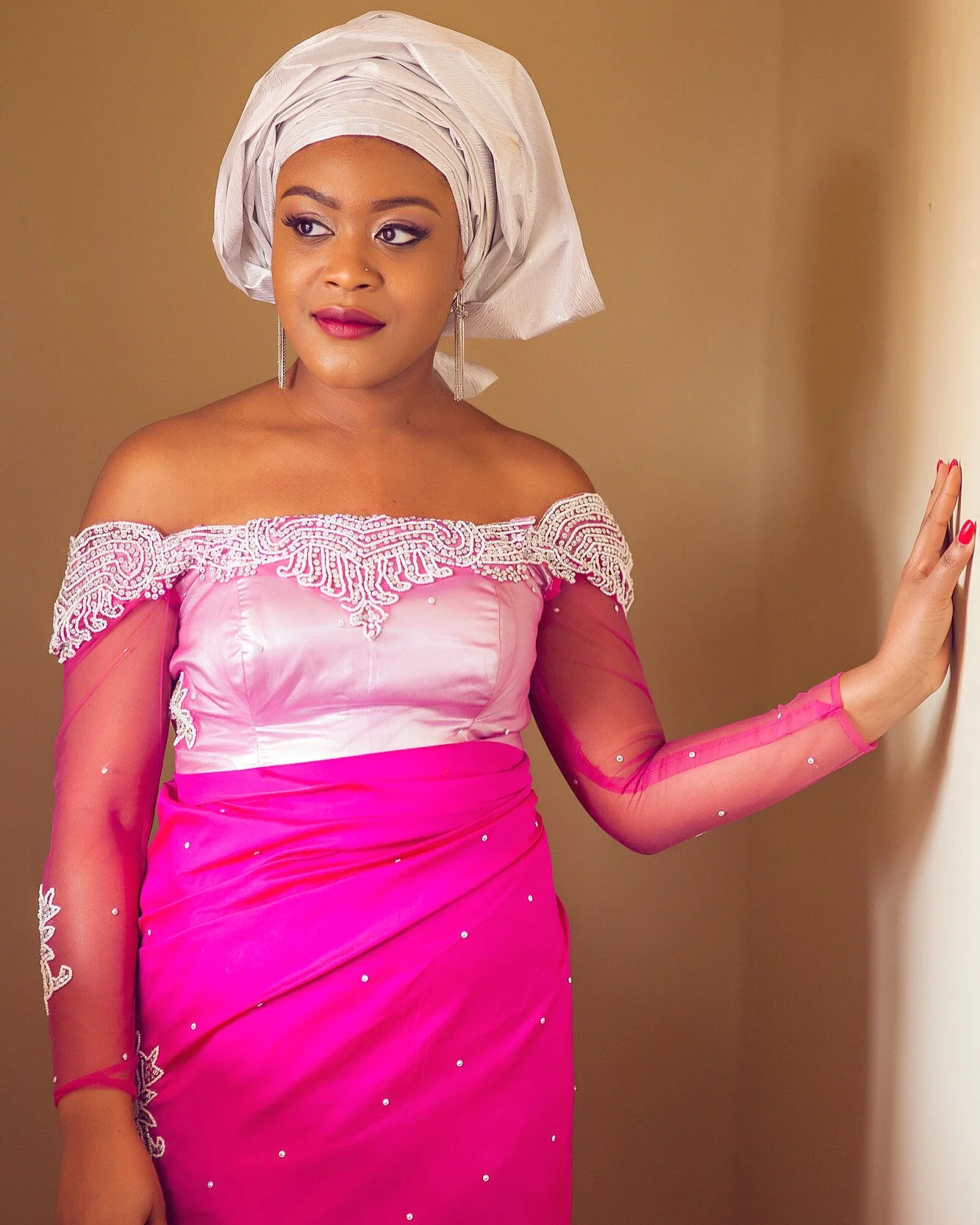THE TROUBLE WITH Aso-ebi
In September, I attended a friend's wedding and it had me thinking about the popularity of aso-ebi nowadays. Since then, I have had sporadic conversations about the purpose of the aso-ebi tradition. I remember seeing my grandmother dressed in aso ebi often to celebrate several functions -- International Women's Day; a Thanksgiving for a fellow church member; for my uncle's funeral. The first time I wore aso-ebi myself was when I was about six or seven years old when I participated in a National Youth Day march in my small town in Cameroon. I did not understand the significance then, but I do remember feeling a sense of pride as I walked down the street. I felt that same pride when I wore aso-ebi again a few years later while attending my uncle's wedding. I loved that I had the chance to identify family (and future family) members. I may not have recognized everyone's faces, but we knew that we were somehow closely related to either the bride or groom.
Preparing my outfit and attending my friend's Michigan wedding allowed me to think through this tradition again in a more conscious fashion. Pun intended. I was eye-deep in the recesses of Naija Weddings of Instagram checking for style ideas and even searching for competent tailors in the Tri-state area (I ended up outsourcing to Maryland). I was overwhelmed by just how much this tradition has taken over the West African wedding space while learning about the economics of this custom. Let me tell you, c'est cher!
A little history first.
What is aso-ebi? It is a uniformed attire, of the same material, color and pattern design, worn by close family during big occasions, whether it be weddings, funerals, or even significant birthday celebrations. It is a distinguished symbol of unity, solidarity and support. Today, the custom has expanded to include close friends.
Nobody seems to know where the concept of aso-ebi started. Some say the tradition is rooted in the issuance of uniforms - school uniforms, army uniforms, prison uniforms, even religious uniforms - during colonial times. Others say this custom evolved in parts of Africa where cultural dress played significant roles, especially among the highly-placed members in society's hierarchy who were often recognized by their attire; attire that was usually not imitated by someone of another class. Whatever the case, our tribal ancestors adopted this custom of aso-ebi and since then it has become a cultural mainstay that has only continued to gain popularity.
Many ethnic groups and countries across Africa follow this tradition, but the Yoruba term "aso ebi", literally meaning "cloth of the family", is used freely by most people in Nigeria and Cameroon. What was once an acquired taste or deemed unnecessary by Africans abroad, the advent of technology has lessened the global divide and has led to somewhat of a convergence of cultures and increased diasporan appreciation of this tradition. Social media and websites like Bella Naija and Asoebi Bella have proliferated its popularity to new heights and the train doesn't seem to be slowing down at all.
In the past, aso-ebi was relegated to cultural dress made from traditional textiles. While this is still the case in many places, aso-ebi has been redefined and has expanded its reach. Fabrics used include regular ankara and lace, but now it has expanded to include wax, george, adire or aso oke to name a few. It's not quite a uniform because people design aso-ebi according to individual style; this extends to head ties and head scarfs.
I love the concept of aso-ebi. When I get married, I plan to have a traditional wedding following Bangwa custom as closely as possible. This includes aso-ebi, of course. However, with the commercialization of aso-ebi, certain issues have arisen that make this practice one of segregation than togetherness in recent years.
1. Dishonesty
The rise in popularity of aso-ebi has led to higher demand and price hikes of materials. This leads to a slow winding path to the potential exclusion of family and friends who may not be able to afford to wear aso-ebi, yet still feel compelled to do so due to society standards and expectations.
There have been reports of sneaky brides and family members who purposely increase the price of the aso-ebi fabric in order to contribute to their wedding costs. Many people who know the market price will be aware of this but may feel uncomfortable broaching the topic with their family member or friend and may just acquiesce. Some will naturally decline the offer to don the aso-ebi. Even worse, some people are not given the choice to accept or refuse.
2. Special Treatment
Another problem I have noticed is the preferential treatment aso-ebi wearers seem to receive at occasions. Naturally, there may be some perks; after all you are supposedly close family and friends to the host/guest of honor. However, guests not in aso-ebi may feel slighted, envious and feel out of place if they are made to feel unimportant and if their presence is hardly acknowledged.
3. You Wear It! You Wear It! Everybody Wear It!
Why would they feel out of place, you ask? You're right, they may not after all. This goes towards my third issue. Aso-ebi may have lost its special spark. Once reserved for close family (and now friends), the recent popularity of traditional (with a Western twist) weddings and the need to always show up, show out and top the last event has made aso-ebi more common place and hence, now worn by any and all who can afford it. This is a generalization., but I do know people who always seem to be making aso-ebi for someone's wedding. Nevertheless, due to this, it is not uncommon to see several aso-ebi at one event - eg. one for immediate family, another for extended family, and another for friends. It doesn't seem like a bad idea but it can be a little confusing. To me, this attempt to make it more inclusive (or to have more colorful pictures) ends up tainting the custom and hampering its significance.
Yes, it is true, The pomp and flash of white weddings have indeed extended to our traditional weddings. I still love the aso-ebi tradition, though. It is beautiful to walk out in a room and view a textile sea of love and support represented in this form of unity. However, over time, all traditions stretch, are taken advantage of and changed to suit external influences and individual aesthetic. I realize that hardly anything is static, but I hope we can keep it organic for as long as possible.
If you wear aso-ebi (or have a similar concept in your country), what is your stance?









